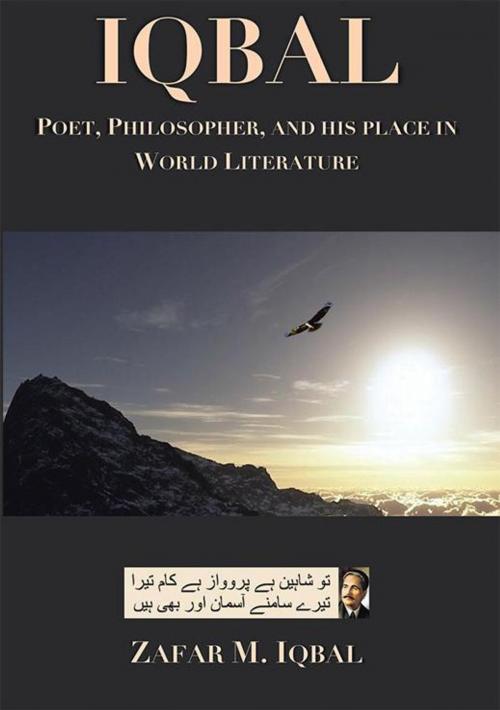| Author: | Zafar M. Iqbal | ISBN: | 9781503530362 |
| Publisher: | Xlibris US | Publication: | February 21, 2015 |
| Imprint: | Xlibris US | Language: | English |
| Author: | Zafar M. Iqbal |
| ISBN: | 9781503530362 |
| Publisher: | Xlibris US |
| Publication: | February 21, 2015 |
| Imprint: | Xlibris US |
| Language: | English |
For most Urdu speakers in the Indian subcontinent, Iqbal has long been one of the most loved and admired poets. Much has been written about his poetry and philosophy . This book stays away from his politics. Iqbal first received recognition in the West in 1920 when his translation of Asrar-e-Khudi by R. A. Nicholson (The Secrets of the Self) first appeared. Most of the recurring criticism was on his concept of Khudi which Iqbal addressed then and later, explaining the basic nature of influence of much older Sufi philosophy on khudi versus Nietzsches bermensch. Several authors, both from the subcontinent and the West, have translated Iqbals poetry before, and in this book have highlighted the positive outcomes over some controversies and confusion. This book presents translation of well over 150 of Iqbals Urdu poems from Kuliyaath-e-Iqbal and about 30 or so from Payam-e-Mashriq (PM), in Persian. Iqbal offered PM as a response to Goethes West-stlicher Diwan, in German. Goethe had long been interested in Eastern (rather, Middle Eastern) culture and his Divan was inspired by the fourteenth-century Persian poet Hafez/Hafiz/Hafis, which also involved some literary traverse through a different religio-philosophical territory. Translation from Urdu or Persian to English across a vast cultural, prosodic, and linguistic gulf presents enormous problems. Section On Translation discusses some of these issues. Although Iqbals philosophy has been covered from by many others before, some of Iqbals own explanation of Khudi in a larger historical Sufi context are discussed here. In addition, Iqbals own contribution to what Goethe called Weltliteratur (or world literature), is recognized in PM (mostly) and elsewhere in his Urdu Kuliyaath. Iqbal not just brought various Western themes and figures to Urdu literature, but presented them, with his own comments and interpretation, to a readership that may have been largely unfamiliar with these Western themes. The Appendices include important recognition Iqbal received in Germany.
For most Urdu speakers in the Indian subcontinent, Iqbal has long been one of the most loved and admired poets. Much has been written about his poetry and philosophy . This book stays away from his politics. Iqbal first received recognition in the West in 1920 when his translation of Asrar-e-Khudi by R. A. Nicholson (The Secrets of the Self) first appeared. Most of the recurring criticism was on his concept of Khudi which Iqbal addressed then and later, explaining the basic nature of influence of much older Sufi philosophy on khudi versus Nietzsches bermensch. Several authors, both from the subcontinent and the West, have translated Iqbals poetry before, and in this book have highlighted the positive outcomes over some controversies and confusion. This book presents translation of well over 150 of Iqbals Urdu poems from Kuliyaath-e-Iqbal and about 30 or so from Payam-e-Mashriq (PM), in Persian. Iqbal offered PM as a response to Goethes West-stlicher Diwan, in German. Goethe had long been interested in Eastern (rather, Middle Eastern) culture and his Divan was inspired by the fourteenth-century Persian poet Hafez/Hafiz/Hafis, which also involved some literary traverse through a different religio-philosophical territory. Translation from Urdu or Persian to English across a vast cultural, prosodic, and linguistic gulf presents enormous problems. Section On Translation discusses some of these issues. Although Iqbals philosophy has been covered from by many others before, some of Iqbals own explanation of Khudi in a larger historical Sufi context are discussed here. In addition, Iqbals own contribution to what Goethe called Weltliteratur (or world literature), is recognized in PM (mostly) and elsewhere in his Urdu Kuliyaath. Iqbal not just brought various Western themes and figures to Urdu literature, but presented them, with his own comments and interpretation, to a readership that may have been largely unfamiliar with these Western themes. The Appendices include important recognition Iqbal received in Germany.















